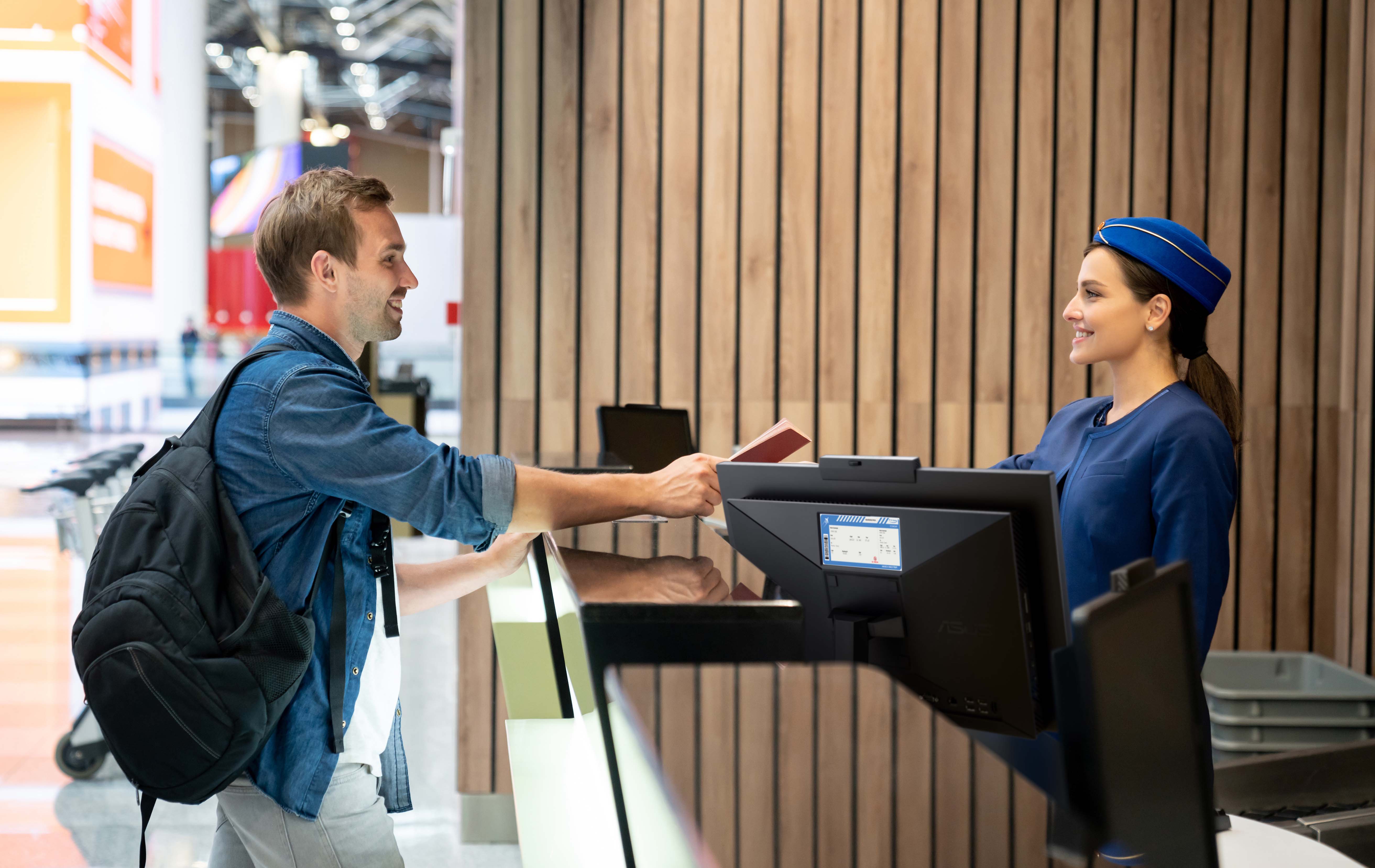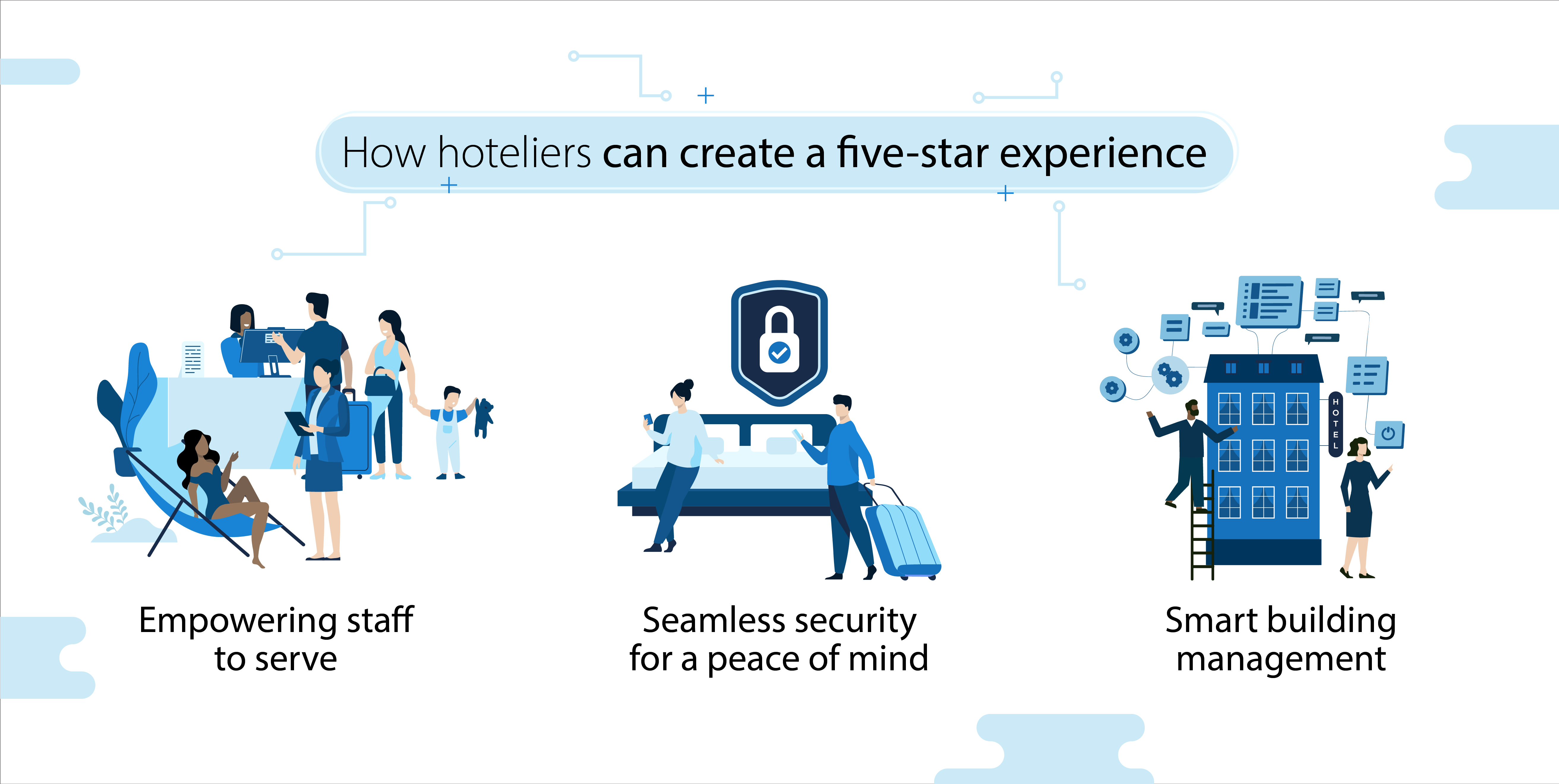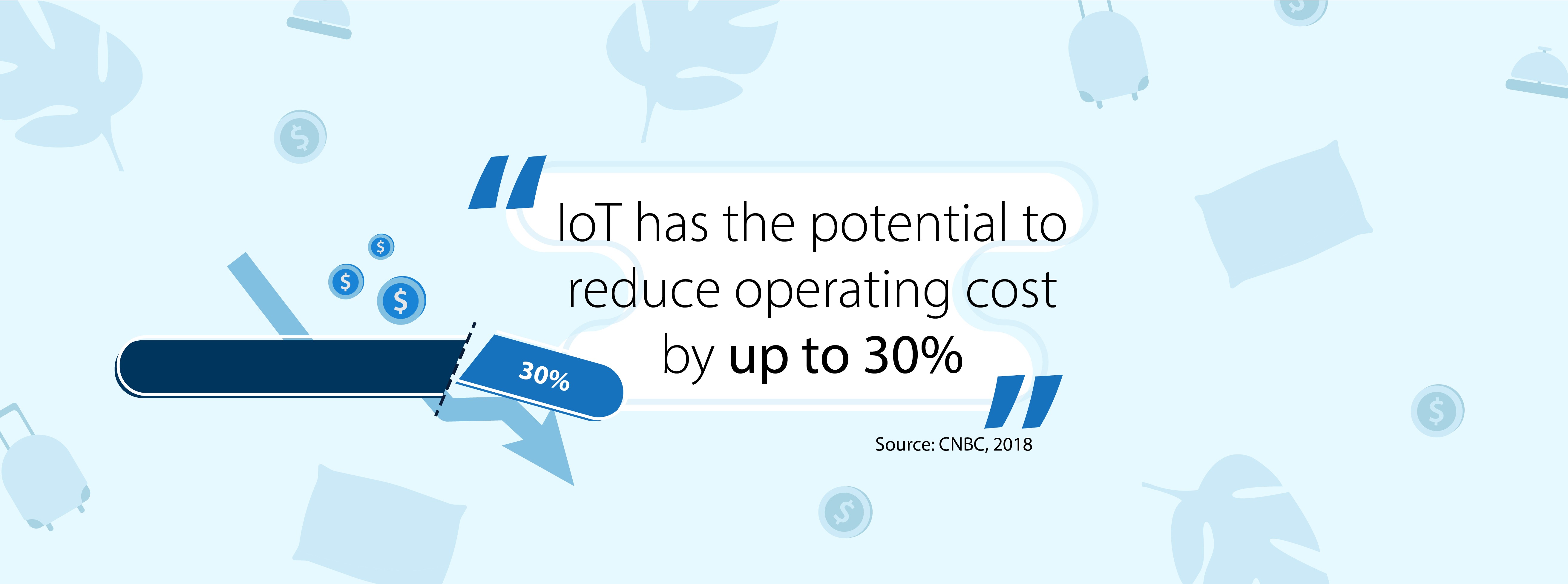Rebooting hospitality: 3 ways to empower staff with intelligent solutions

As concerns over the pandemic ease, travel is seeing a spike and hotel reservations are on a heightened rebound. There is renewed urgency to travel, and people are willing to splurge on extravagant trips and epic destinations. In fact, 65% of potential travellers are planning to “go big” on their next trip1.
Hoteliers will need to act fast to boost service offerings, efficiency, and customer personalisation if they hope to attract these travellers, retain them, and rebuild customer loyalty. To create a five-star experience that anticipates consumer needs, hoteliers can empower staff with digital tools to improve service performance and customer experience. On a micro-level, such enhancement can include equipping staff with devices that can accompany them on the go and support them in optimizing security with ease. And on a comparatively macro-level of management, it can assist them with smart building management for optimised resource allocation.
Here are some ways hoteliers can do just that.

Empowering staff to serve
By having tools readily available for staff from check-in to service on the go, they will be able to provide a higher level of service and cater to guests’ needs more effectively.
A seamless check-in sets the right tone for guests’ stay. While safe distancing measures may still be present (such as having a glass panel separating them from the receptionist at check-in), customers still expect uninterrupted interactions with staff. Notably, 60% of organisations are looking to deliver memorable engagements that recreate physical experiences by 20232 — it’s safe to say that face-to-face interaction remains king and hoteliers should deploy the tools needed to deliver flawless service and communication.
Using a device that has a main screen facing the receptionist and a second, outward-facing screen for guests to view at reception, such as the ASUS VeriView screen of the ASUS ExpertCenter E5 AiO, can greatly benefit communication and customer experience. For example, a hotel receptionist can enter information on the main screen while the guest views information relevant to their stay on the second screen facing them. This allows for better two-way interaction, and ensures that guests find their stay effortless from the moment they arrive.
Beyond checking in, the right mobile device can help staff on the go provide value-added service. The ASUS ExpertBook B3 Detachable with its water-resistant keypad is one such device. Be it in the restaurant or by the pool, service staff can take orders with the garaged stylus without having to memorise complex order codes. Ultra-thin with long battery life, it provides a more efficient and streamlined experience for guests overall.
Seamless security for a peace of mind
Notably, 25% of spending on security devices will be devoted to developing and maintaining a trust framework by 20253. One element of this involves improving data security with the right devices. This will help hoteliers quickly identify and resolve any issues, ensuring that their property is always running smoothly for the best hotel experience.
Keeping on top of every hotel department while keeping the data of every guest secure can be tricky, but using devices with built-in enterprise-grade security is the first step. The ASUS ExpertBook B9 is one device that ensures that all confidential data is kept safe while powering quick, effective computing. Where threats move at lightning speed these days, reliable computing for faster operations cannot be overvalued as well. The super-fast Intel WiFi 6E of the ASUS ExpertBook B9 provides this as well as ample capacity with its dual 2TB SSDs.
The ASUS Control Center for IT is one example of a real-time IT monitoring and management tool, and can monitor and control hardware and software in a centralised manner. An IDC survey found that 70% of enterprises say that they expect all devices (including PCs, phones and tablets) to be managed by a single unified endpoint management system in the next five years4. This is unsurprising since seamless integration across device types and OS platforms with intuitive end-user experience can optimise productivity and costs. Centralised, intelligent IT and data management tools can include systems like the ASUS servers and workstations to notebooks and desktops. Where a hotelier’s reputation is at stake, every element of the hotel’s operations must be overseen and utterly reliable.
Smart building management
Finally, on a more macro-scale, smart building management can help staff manage the property more efficiently while providing tailored experiences. Solutions like Internet of Things (IoT) accompanied by intelligent devices can give hoteliers real-time insights into what is happening on the property, allowing them to take proactive measures to improve how resources are serving customers.

IoT can improve building optimisation and guest confidence. In fact, IoT adoption is growing fast enough that McKinsey predicts that IoT can create $5.5 trillion to $12.6 trillion in global economic value by 20305. IoT has the potential to reduce operating costs by up to 30%6. From adjusting room lighting and temperature to suit the number of occupants to enabling automated coffee recommendations as guests approach the beverage machines, hoteliers can optimise the building for both cost efficiency and superior guest experience.
More significantly, the devices that hoteliers connect in their IoT need to be easy to reliable, flexible and engineered for privacy and durability. The portability of the ExpertBook B5 Flip, for instance, can greatly simplify inventory checks and ordering of key supplies. It also supports RAID technology which allows multiple drives to behave as one for enhanced performance with improved data security.
To complement the centralised connectivity of IoT, hoteliers can also consolidate the assets used by staff across their network for comprehensive software and hardware management. The ASUS Control Center for IT can also execute tasks at assigned timings and provide remote control of devices.
Ultimately, with connected, intelligent devices integrated across a network, hotels will be empowered to manage every detail and deliver every room just right. And by making it easier for staff to manage the property, hoteliers can free up their time to focus on more important tasks like providing outstanding customer service.
Intelligent hotels for rebuilding customer loyalty
Fundamentally, hoteliers can improve service performance and customer experience by empowering staff with digital tools. If done right, hoteliers would be able to design a thoughtful customer experience well-positioned to rebuild customer loyalty and enable their hotel to thrive in the new era of travel.
- CNBC, The biggest travel trend of 2022: Go big, spend big
- IDC, IDC FutureScape: Future of Customers and Consumers 2022 Predictions
- IDC, Edge Strategies for the Next Generation of Infrastructure and Applications
- IDC, Unifying Endpoint Management Toward the Digital Workspace Experience
- Forbes, IoT And Where It’s Going
- CNBC, How unlocking the potential of a smart building can reduce cost and boost business

